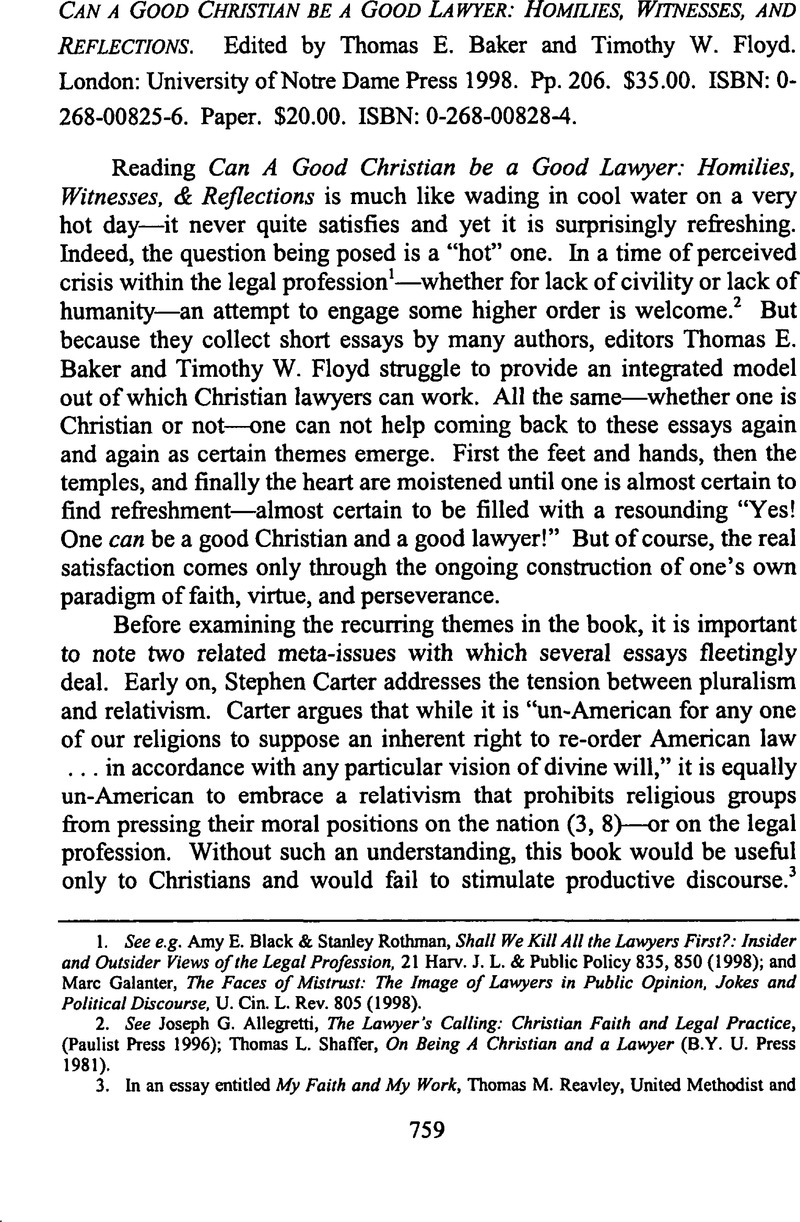No CrossRef data available.
Published online by Cambridge University Press: 24 April 2015

1. See e.g. Black, Amy E. & Rothman, Stanley, Shall We Kill All the Lawyers First?: Insider and Outsider Views of the Legal Profession, 21 Harv. J. L. & Public Policy 835, 850 (1998)Google Scholar; and Galanter, Marc, The Faces of Mistrust: The Image of Lawyers in Public Opinion, Jokes and Political Discourse, U. Cin. L. Rev. 805 (1998)Google Scholar.
2. See Allegretti, Joseph G., The Lawyer's Calling: Christian Faith and Legal Practice, (Paulist Press 1996)Google Scholar; Shaffer, Thomas L., On Being A Christian and a Lawyer (B.Y. U. Press 1981)Google Scholar.
3. In an essay entitled My Faith and My Work, Thomas M. Reavley, United Methodist and Senior Judge, U.S. Court of Appeals for the Fifth Circuit, also notes that while he has his beliefs and others have theirs, he is not a relativist. As he states, “I am entitled to attempt to persuade others to adopt my faith, but I proceed with respect for them.” (Reavley, 103, 109) Similarly, in his essay, Aunt Nell's Disappointment, Robert W. Nixon, Seventh-day Adventist and lawyer, argues that “in a pluralistic society, faith by force goes against the so-called Golden Rule … however, every believer and every religious community has every right to participate in and speak out in the public square.” (Nixon, 167, 171)
4. See e.g. Collett, Teresa Stanton, To Be a Professing Woman (53)Google Scholar; Wiltshire, Ashley T. Jr., Religion and Lifework in the Law (74)Google Scholar; Gross, Joanne, The Deliberations of Mortals and the Grace of God (96)Google Scholar; DiSalvo, Charles R., Reflections on the Contents of the Lawyer's Work: Three Models of Spirituality—and Our Struggle with Them (127)Google Scholar; Allegretti, Joseph G., Neither Curse nor Idol: Towards a Spirituality of Work for Lawyers (147)Google Scholar; Porter, Thomas W. Jr., Engaging the Law (159)Google Scholar; and Shaffer, Thomas L., Maybe a Lawyer Can be a Servant; If Not … (193)Google Scholar.
5. Keynote speech for the Series sponsored by the U. of St. Thomas and William Mitchell College of Law on “Rights and Responsibilities: The Crisis in Professions and the Communities” entitled “Professions Under Siege: Can Ethical Autonomy Survive?” 2/20/97.
6. Roman Catholic, Gen. Counsel, Natl. Conf. of Catholic Bishops & U.S. Catholic Conf., Wash., D.C.
7. See e.g. Amos 2:6, 4:1, 5:11-13, 6:1-6, 8: 4-6 & Isaiah 1:23, 5:23, 10:1-2, 24:5, 32:6.
8. God exhibits both justice and mercy throughout the Old Testament. For example, he punishes Cain for slaying Abel but protects him from others' wrath by marking him. Gen 4:1-16. Similarly, God holds David accountable for his sins of adultery, deception, and murder in the taking of Bathsheba, but continues his loving covenant with him. 2 Sam 11.
9. See Ball, William Bentley, On Hoping to Be, Being, and Having Been (42)Google Scholar; Matheny, Tom H., My Faith and My Work (68)Google Scholar; Wiltshire (77); DiSalvo (131); and Cromartie (139).
10. Reavley also argues that all lawyers, especially judges, need to pray in an effort to humble themselves before their creator. (Reavley, 105).
11. For example, Thomas A. Wiseman, Jr., What Doth the Lord Require of Thee where he argues that as a judge in the appellate court system he must recognize his capacity for error. (Weisman, 35, 39) This makes for a humble self-esteem. Nancy Miller-Herron, On Maintaining Spiritual Sanity in a Secular Vocation, puts it best when she writes, “The first struggle is to recognize and accept my limits, or in theological language, to recognize that I am a creature of God, but [I am] not God.” (Miller-Herron, 28, 30).
12. Reavley describes his conscience being rooted in the Catholic and Protestant traditions from which he descended as well as the specific teachings of the Catholic Church about the dignity and sacredness of human life. See Cromartie, for a discussion of theology as “autobiography.” (Cromartie, 140-144).
13. A lawyer's everyday activities, DiSalvo and Droel claim, can build up God's Kingdom. “For example, a bond counsel must decide whether the projects being underwritten are worthy of respect and, therefore, his or her talent and efforts.” (DiSalvo & Droel, 133).
14. Taking this one step further, Reavley asserts that clients may be influenced by the attorney to change their aims and to utilize more honest means. (Reavley, 107).